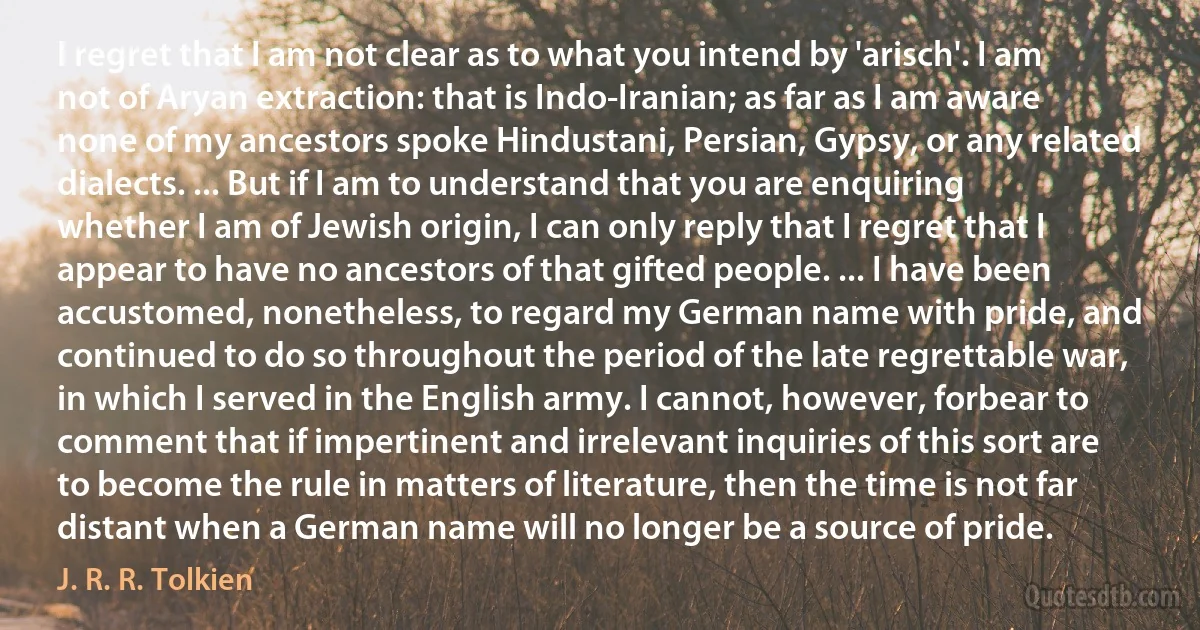
I regret that I am not clear as to what you intend by 'arisch'. I am not of Aryan extraction: that is Indo-Iranian; as far as I am aware none of my ancestors spoke Hindustani, Persian, Gypsy, or any related dialects. ... But if I am to understand that you are enquiring whether I am of Jewish origin, I can only reply that I regret that I appear to have no ancestors of that gifted people. ... I have been accustomed, nonetheless, to regard my German name with pride, and continued to do so throughout the period of the late regrettable war, in which I served in the English army. I cannot, however, forbear to comment that if impertinent and irrelevant inquiries of this sort are to become the rule in matters of literature, then the time is not far distant when a German name will no longer be a source of pride.
J. R. R. TolkienRelated topics
appear army aryan clear english extraction far gypsy late longer name none people pride regret reply rule sort source spoke time war enquiringRelated quotes
The worst thing that can happen to advanced devotees who are fixed in Krishna consciousness is that they will go back to the spiritual world. Thus, they are enabled by calamitous situations to go back to Krishna more quickly. It is a part of the process of devotion that from time to time everyone must be tested in various ways. When we take to devotional service we are declaring war against Maya. We are on a battlefield, engaged in our own battle of Kuruksetra. We shouldn't read the Bhagavad-gita and think that it is merely some fascinating ancient history and philosophy. We should also understand that Arjuna is representing every person who is trying to take shelter of Krishna. Arjuna had to undergo bewilderment and serious choices, but Krishna was present to protect him.

Bhakti Tirtha Swami
Let us imagine that the aboriginal-original human specimen was one of two brother apes, A and B; they were alike in every respect; both were animal space-binders; but something strange happened to B; he became the first time-binder, a human. ... He had thus a new faculty, he belonged to a new dimension; but, of course, he did not realize it; and because he had this new capacity he was able to analyze his brother "A"; he observed "A is my brother; he is an animal; but he is my brother; therefore, I AM AN ANIMAL." This fatal first conclusion, reached by false analogy, by neglecting a fact, has been the chief source of human woe for half a million years and it still survives. ... He [then] said to himself, "If I am an animal there is also in me something higher, a spark of some thing supernatural."

Alfred Korzybski
For what advantage is it, that the world enjoys profound peace, if thou art at war with thyself? This then is the peace we should keep. If we have it, nothing from without will be able to harm us. And to this end the public peace contributes no little: whence it is said, ‘That we may lead a quiet and peaceable life.' But if any one is disturbed when there is quiet, he is a miserable creature. Seest thou that He speaks of this peace which I call the third (inner, ed.) kind? Therefore when he has said, ‘that we may lead a quiet and peaceable life,' he does not stop there, but adds ‘in all godliness and honesty.' But we cannot live in godliness and honesty, unless that peace be established. For when curious reasonings disturb our faith, what peace is there? or when spirits of uncleanness, what peace is there?

John Chrysostom
During his last illness [in 1845], when no longer able to walk, he used to be wheeled about the house in a chair, and on one occasion, when stopping, as he often did, before Mr. Fox's bust, and speaking of the influence he had held over him, he added, ‘Yet he did not always use it as he might of done-one word from him would have kept me out of all the mess of the "Friends of the People,” but he never spoke it.' When I remarked that, considering he only advocated as one of that Society the principles to which he had given effect as Minister, this was hardly to be regretted, he replied, ‘that might be true, but there were men joined with them in that Society, whose views, though he did not know it at the time, were widely different from his own, and with whom it was not safe to have any communication.'

Charles Grey, 2nd Earl Grey
The art of the future will give form to our scientific convictions; this is our religion and our truth, and it is profound and weighty enough to produce the greatest style and the greatest revaluation of form that the world has ever seen. Today, instead of using the laws of nature as a means of artistic expression, we pose the religious problems of a new content. The art of our time will surely have profound analogies with the art of primitive periods long past, without of course, the formalistic similarities now senselessly sought by many archaist artists [Marc rejects abstraction of Cubism, among others]. And our time will just as surely be followed in some distant, ripe, late European future by another period of cool maturity, which in its turn will again set up its own formal laws and traditions. [written at the front of World War 1.

Franz Marc
